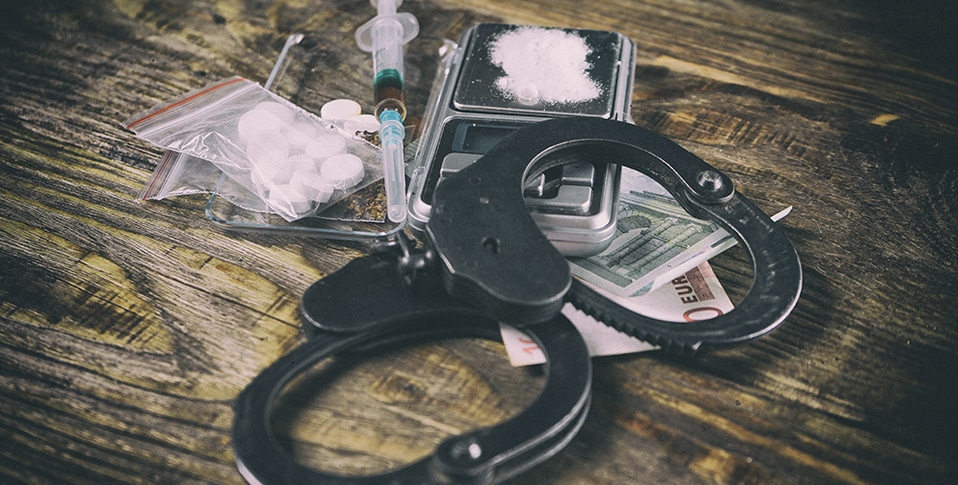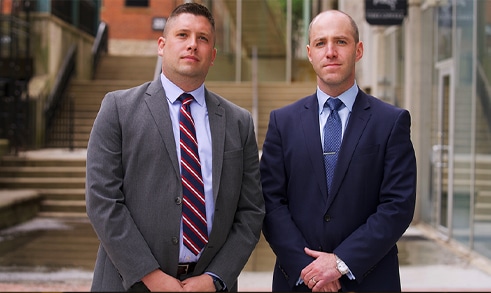
Columbus Drug Possession Defense Lawyers
Strong advocacy in Columbus for those charged with possession of an illegal drug
Don’t assume that the government only goes after the manufacturers, sellers, and distributors of drugs. If you are caught with a controlled substance without a legal prescription, you will be charged with possession. If you are convicted, you will likely be facing a prison sentence, large fines, and lifetime consequences. Your driver’s license can also be suspended.
At Soroka & Associates, our respected Columbus drug defense lawyers handle all types of state and federal drug crimes, including possession of controlled substances. We understand all defenses that apply to your case, including requesting that the seizure of any drugs from you or your home violated your Constitutional rights. Our defense lawyers work to obtain dismissals and acquittals, as well as negotiate plea bargains to less serious crimes. In some cases, you may be eligible for a drug treatment program.
How can we help?
- How are drugs categorized in Ohio?
- Is marijuana legal in Ohio?
- What are the penalties for possession of marijuana in Columbus?
- What are the penalties for controlled substances in Columbus?
- How can your Columbus drug possession defense attorneys help my case?
- Am I eligible for drug court?
- Do you have a drug possession defense lawyer near me?

How are drugs categorized in Ohio?
Ohio classifies drugs according to schedules. Drugs are classified based on:
- Its actual or relative potential for abuse
- The scope, duration, and significance of that abuse
- The risk it poses to the public health.
These are similar to federal controlled substance classifications.
A Schedule I drug (the most dangerous type of controlled substance) has a high potential for abuse, no currently accepted medical use in the United States, and a lack of accepted safety for use of the drug under medical supervision. Heroin, for example, is a Schedule I drug.
A Schedule V drug (the least dangerous type of controlled substance has a “low potential for abuse relative to the drugs or other substances in schedule IV,” a currently accepted medical use in treatment in the United States, and “may lead to limited physical dependence or psychological dependence relative to the drugs or other substances in schedule IV.” Schedule V drugs include limited amounts of opioids and stimulants.
Is marijuana legal in Ohio?
Recreational marijuana use is not legal – though there is a ballot initiative for November 2022 that all Ohio registered voters can vote for or against.
Ohio does, however, have a medical marijuana law. Ohio’s medical marijuana control program provides that patients who are properly registered can legally possess and use marijuana under specific conditions. Medical marijuana is defined as “marijuana that is cultivated, processed, dispensed, tested, possessed, or used for a medical purpose.”
Patients who qualify need a recommendation from an Ohio doctor approved by the state to verify if a patient has an approved health condition. The patient then needs to register for an Ohio marijuana card with the Ohio Medical Marijuana Patient Registry. Patients who have a medical marijuana card are limited to a “90-day supply of medical marijuana in its various forms, with the exact amount to be determined by the Board of Pharmacy.”
Some of the approved medical conditions include:
- Acquired immune deficiency syndrome
- Alzheimer’s disease
- Cancer
- Epilepsy or another seizure disorder
- Fibromyalgia
- Glaucoma
- Hepatitis C
- Inflammatory bowel disease
- Multiple sclerosis
- Parkinson’s disease
- Positive status for HIV
- Post-traumatic stress disorder
- Sickle cell anemia
- Spinal cord disease or injury
- Traumatic brain injury
- Other approved diseases
What are the penalties for possession of marijuana in Columbus?
If the amount of marijuana in your possession is less than 3.5 ounces (100) grams, this is technically a misdemeanor. There is generally no jail time and a $150 fine.
The penalties for possession of non-medical marijuana, including recreational marijuana, are as follows. If the amount of the drug involved equals or exceeds (subject to other conditions):
(a) Except as otherwise provided in division (C)(3)(b), (c), (d), (e), (f), or (g) of this section, possession of marihuana is a minor misdemeanor.
(b) If the amount of the drug involved equals or exceeds one hundred grams but is less than two hundred grams, possession of marihuana is a misdemeanor of the fourth degree.
(c) If the amount of the drug involved equals or exceeds two hundred grams but is less than one thousand grams, possession of marihuana is a felony of the fifth degree, and division (B) of section 2929.13 of the Revised Code applies in determining whether to impose a prison term on the offender.
(d) If the amount of the drug involved equals or exceeds one thousand grams but is less than five thousand grams, possession of marihuana is a felony of the third degree, and division (C) of section 2929.13 of the Revised Code applies in determining whether to impose a prison term on the offender.
(e) If the amount of the drug involved equals or exceeds five thousand grams but is less than twenty thousand grams, possession of marihuana is a felony of the third degree, and there is a presumption that a prison term shall be imposed for the offense.
(f) If the amount of the drug involved equals or exceeds twenty thousand grams but is less than forty thousand grams, possession of marihuana is a felony of the second degree, and the court shall impose as a mandatory prison term a second degree felony mandatory prison term of five, six, seven, or eight years.
(g) If the amount of the drug involved equals or exceeds forty thousand grams, possession of marihuana is a felony of the second degree, and the court shall impose as a mandatory prison term a maximum second degree felony mandatory prison term.
Depending on the circumstances, you can also be charged with “Possessing drug abuse instruments,” “Illegal use or possession of marijuana drug paraphernalia,” and many other drug crimes.
What are the penalties for controlled substances in Columbus?
The penalties for possession of any controlled substance in Ohio are quite severe.
The penalties for Schedule I and Schedule II controlled substances are the most severe. Generally, all possession of Schedule I or Schedule II drugs are felonies punishable by terms of incarceration between six months to 11 years in jail, and fines of $2,500 to $20,000 depending on the severity of the felony.
There are separate penalties if “the drug involved in the violation is cocaine or a compound, mixture, preparation, or substance containing cocaine.” For example, possession of:
- 27 grams or more, but less than 100 grams of cocaine is a felony in the first degree (a fine of up to $20,000, at least three and up to 11 years in prison, or both).
- 100 grams or more of cocaine is a felony in the first degree (a fine of up to $20,000, 11 years in prison, or both).
How can your Columbus drug possession defense attorneys help my case?
At Soroka & Associates, our Columbus drug possession defense lawyers often file motions to suppress evidence of drug possession based on violations of the Fourth Amendment requirements for legal searches and seizures. We also seek to suppress drug evidence if the chain of custody of the drugs from the time the drugs were seized through trial is broken.
Other defenses include arguing that the drugs belonged to somebody else, that the police entrapped you, that the drugs weighed less than the prosecution claims, and that had you had a legal prescription. We assert all other Constitutional, legal, and factual defenses that can help preserve your freedom.
Am I eligible for drug court?
Franklin County (home to Columbus) does have drug courts that focus on treatment instead of incarceration. Drug Court options exist in both the Common Pleas Court and the Municipal Court.
The eligibility requirements include crimes that are not more severe than felonies of the 4th or 5th degree, that you meet the criteria for "presumption for probation" per sentencing guidelines, a “primary diagnosis of chemical dependency,” and “sufficient motivation for treatment/change.” There are other conditions as well.
Treatment is Essential to Success is one of the programs available in Common Pleas Court (TIES.) This programs last for three 12-week phases and a six-month probation period after the third phase. Most people who participate need 18 months to complete the full program. The court will monitor the success of your participation and apply sanctions for non-compliance. If you qualify, you will have to pay restitution, fines, court costs, and abstain from drug use. The program is supervised by a judge, probation official representatives, the legal dense bar, the Franklin County Prosecutor’s office, and others.
Our lawyers work to help show you qualify.
Do you have a drug possession defense lawyer near me?
Our Columbus office is located at 503 South Front Street, Suite 205. We’re close to I-71 and Rt. 23. We meet clients at home or detention facilities if needed.
Speak with a seasoned Columbus drug possession lawyer today
Get help now. Speak with the Columbus drug possession defense lawyers at Soroka & Associates today. We’ll explain that you should stay silent – we will do the talking for you. We’ll fight for you from the moment of an arrest through jury trial and appeal. There are often defenses. Many times, the prosecution is willing to negotiate. Alternatives to imprisonment may be possible. To speak with an experienced criminal defense lawyer, call us at 614-918-4078 or use our contact form to schedule a free consultation.
